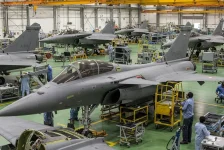- Views: 2K
- Replies: 22

The US President Trump is reportedly considering granting India a status equivalent to NATO allies in terms of arms procurement, according to defense analysts. This move could significantly streamline the process for India to acquire advanced American weaponry, potentially including the F-35 fighter jet.
Such a policy shift would mean India would face fewer bureaucratic hurdles and licensing delays when purchasing US military equipment. This could expedite the acquisition of cutting-edge technology, eliminating the need to first purchase less advanced platforms.
For the Indian Air Force (IAF), this could represent a significant opportunity to modernize its aging fleet. Access to the F-35A Lightning II, a fifth-generation stealth fighter, would bolster India's air superiority and strategic deterrence capabilities in the region.
Historically, India's access to US defence technology has been restricted by the International Traffic in Arms Regulations (ITAR). Granting NATO-like status would effectively bypass these regulations, facilitating smoother arms transfers.
This potential move is widely seen as part of a broader US strategy to counterbalance China's growing influence in the Indo-Pacific. A stronger Indian military is viewed as a key element in this strategy.
However, no concrete deals or timelines have been confirmed. The implementation of this policy would depend on various political factors both in the US and India.
For India, this could mean not only enhanced military capabilities but also potential opportunities for co-production and technology sharing, boosting its domestic defense industry.
Acquiring advanced platforms like the F-35A would also entail significant financial considerations, including the cost of maintenance and long-term support. These factors would need careful consideration in India's defense budget planning.


